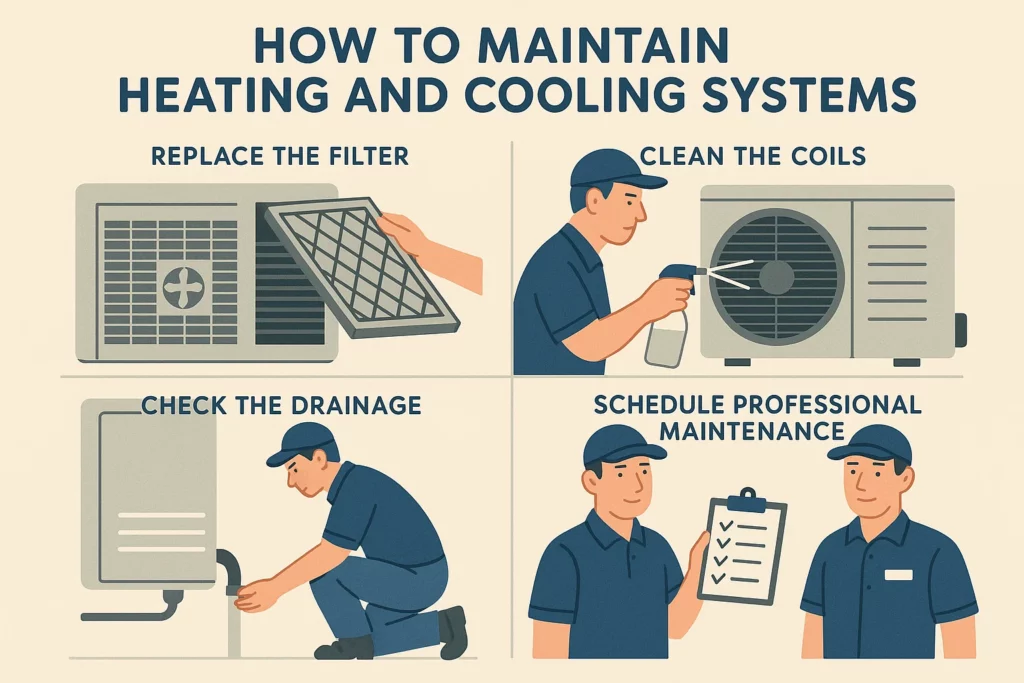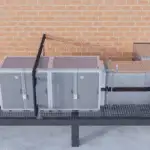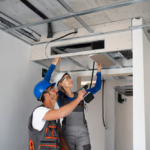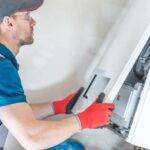As a homeowner, you know how vital a good HVAC system is. It makes your home comfy, no matter the season. But, to keep it working well, you need to do regular HVAC maintenance.
Looking after your heating and cooling system brings many perks. You get better energy use, a longer system life, and cleaner air inside. This means you can stay cool in summer, breathe easy all year, and live in high comfort. Our top-notch HVAC services give you peace of mind, covering everything from setup to fixes.
Key Takeaways
- Regular HVAC maintenance improves energy efficiency.
- Proper care extends the lifespan of your heating and cooling system.
- Well-maintained HVAC systems provide better indoor air quality.
- Our HVAC solutions are designed for your comfort and peace of mind.
- From installations to repairs, we’ve got you covered.
The Importance of Regular HVAC Maintenance
To stay cool and comfortable, knowing about HVAC maintenance is essential. Keeping your heating and cooling systems in check is not just a routine. It’s a must for their efficient and effective operation.
Energy Efficiency Benefits
Regular HVAC maintenance boosts energy efficiency. A well-kept system uses less energy, which cuts down your bills. You can save money with a highly efficient HVAC system.
Extended System Lifespan
Maintenance is key to a longer HVAC system life. Regular checks and fixes prevent big problems. This way, your system lasts longer, keeping your home comfortable for years.
Improved Indoor Air Quality
A well-maintained HVAC system also means better air inside. Regular cleaning and checks cut down on allergens and pollutants. This is great for people with breathing problems.
| Maintenance Task | Benefits |
| Regular Filter Replacement | Improved Air Quality, Increased Efficiency |
| Coil Cleaning | Enhanced Heat Transfer, Reduced Energy Consumption |
| System Inspections | Early Detection of Issues, Extended System Lifespan |
Understanding Your HVAC System Components
Knowing your HVAC system’s parts is vital for its efficiency and life span. It has several key components that work together. They provide heating, cooling, and ventilation for your home.
Heating System Basics
The heating part of your HVAC system warms your home. You might have furnaces or heat pumps. Furnaces use fuel or electricity to heat, while heat pumps move heat from one place to another. Keeping these units well-maintained is important for safe and efficient operation.
Cooling System Basics
The cooling part of your HVAC system cools your home by removing heat. You might have air conditioners or cooling heat pumps. To keep them working well, check refrigerant levels, clean condenser coils, and ensure good airflow.
Ventilation and Air Quality Components
Ventilation and air quality parts are key for clean indoor air. They include air filters, ductwork, and ventilation fans. Keeping these parts clean and well-maintained is essential for the best performance.
| Component | Function | Maintenance Tips |
| Furnace/Heat Pump | Heating | Regular inspections, filter changes |
| Air Conditioner/Cooling Heat Pump | Cooling | Check refrigerant, clean condenser coils |
| Air Filters/Ductwork | Ventilation/Air Quality | Replace filters, inspect ductwork for leaks |
Essential Tools and Materials for HVAC Maintenance
Starting with the basics is key for HVAC maintenance. You need the right tools and parts. This ensures your home stays comfortable. A good toolkit and replacement parts are a must.
Basic Tool Kit Recommendations
For DIY HVAC work, you’ll need various tools. A basic set includes a screwdriver, pliers, wrenches, and a multimeter for electrical checks. A vacuum pump and gauge set are also handy for refrigerant tasks.
Essential tools to keep on hand:
- Screwdriver set
- Pliers and wrench set
- Multimeter
- Vacuum pump and gauge set
Replacement Parts to Keep on Hand
Some parts are used often and should be stocked. Air filters, for example, keep air quality and system efficiency up. Thermostat batteries, circuit breakers, and capacitor backups are also key for your HVAC.
Common replacement parts:
- Air filters
- Thermostat batteries
- Circuit breakers
- Capacitors
How to Maintain Heating and Cooling Systems: DIY Monthly Tasks
To keep your HVAC system running well, doing monthly DIY tasks is key. Spending a few minutes each month on simple maintenance can boost your system’s performance and life span.
Air Filter Replacement Guide
Replacing your air filter is a simple yet powerful HVAC maintenance tip. A dirty filter can make your system work harder and reduce airflow. To replace it, first, turn off your HVAC system. Then, find the filter, usually in the return air duct or near the furnace.
Remove the old filter and clean the area. Put in a new filter that fits your system right.
Thermostat Calibration and Programming
Calibrating and programming your thermostat is key for efficient HVAC use. Check your thermostat’s accuracy by comparing it with a separate thermometer. If it’s off, adjust it as the manufacturer suggests.
Also, set your thermostat to change temperatures when you’re away or sleeping. This can save a lot of energy.
Checking and Cleaning Vents and Registers
It’s important to check and clean your vents and registers regularly. Make sure all vents are clear of furniture or curtains. Use a vacuum or a damp cloth to clean them.
This keeps the air flowing well and stops dust and allergens from spreading.
By adding these easy tasks to your monthly routine, you can make your home more comfortable. You’ll also cut down on energy bills and make your HVAC system last longer. Regular maintenance and care for your heating and cooling systems can make your home a cozy haven. Read more: What are the benefits of heating and cooling?
Seasonal Maintenance Schedule
Your HVAC system needs regular care to work well all year. Changing your maintenance tasks with the seasons keeps your system efficient.
Spring Preparation Tasks
Spring is the time to get your HVAC ready for warmer weather. Start by:
- Inspecting and cleaning the condenser coils to improve efficiency.
- Checking refrigerant levels to prevent leaks or damage.
- Ensuring the thermostat is calibrated correctly for accurate temperature control.
Spring maintenance gets your system ready for summer. It also spots problems early.
Summer Maintenance Checklist
Summer is when your HVAC system works the hardest. To stay efficient:
- Regularly check and replace air filters to ensure proper airflow.
- Keep outdoor units free from debris and vegetation.
- Monitor your thermostat settings to optimize energy usage.
Following this summer maintenance checklist prevents overheating and saves on energy bills.
Fall and Winter Preparation
As winter comes, get your HVAC ready with:
- Inspecting and cleaning the furnace or heat pump.
- Checking for any gas leaks or issues with the ignition system.
- Ensuring your home is well-insulated to maximize heating efficiency.
A well-maintained HVAC system is key for comfortable winter temperatures. Preparing in the fall means a warm home all winter.
| Season | Key Maintenance Tasks |
| Spring | Inspect and clean condenser coils, check refrigerant levels, calibrate thermostat. |
| Summer | Check and replace air filters, keep outdoor units clear, monitor thermostat settings. |
| Fall/Winter | Inspect and clean furnace or heat pump, check for gas leaks, ensure home insulation. |
Outdoor Unit Maintenance Procedures
Keeping your outdoor HVAC unit in good shape is key to its efficiency and lifespan. Regular maintenance is essential for it to work well. Here are some important tasks to do often.
Condenser Coil Cleaning Steps
Cleaning the condenser coils is a must. Dirt on the coils can make your system less efficient. First, turn off the unit’s power. Then, use a garden hose to spray the coils and remove dirt.
For tougher dirt, use a coil cleaning solution and a soft-bristled brush. This will help get rid of stubborn dirt.
Checking Refrigerant Lines and Connections
It’s important to check the refrigerant lines and connections. Look for any damage, leaks, or wear. Also, check the insulation on the lines to make sure it’s not damaged.
If you find any problems, get a professional to fix them. This will prevent damage to your system and keep it running efficiently.
Maintaining Proper Clearance and Debris Removal
Having enough space around the outdoor unit is vital. Make sure the area is clear of leaves, debris, and plants. At least 12 inches of space is needed.
Check the area often and clean it as needed. This will help your unit work better and last longer.
| Maintenance Task | Frequency | Benefit |
| Condenser Coil Cleaning | Every 6 months | Improved Efficiency |
| Refrigerant Line Inspection | Annually | Prevents Leaks and Damage |
| Clearance and Debris Removal | Every 3 months | Ensures Proper Airflow |
By doing these maintenance tasks, you can keep your HVAC system running smoothly. This will save energy and keep you comfortable.
Indoor Unit and Ductwork Care
To breathe easy, it’s key to know how to care for your indoor HVAC unit and ductwork. Keeping these parts in good shape is vital for clean air and efficient system performance.
Evaporator Coil Maintenance
The evaporator coil is a key part of your HVAC system, pulling heat out of your home. To keep it working well, make sure it’s clean and free of dust and dirt. A dirty coil can make your system less efficient and raise your energy bills. Cleaning the evaporator coil often can boost your system’s performance and extend its life.
Blower Motor and Fan Inspection
It’s important to check the blower motor and fan regularly. Look for dust, worn belts, and if they’re well-lubricated. A well-kept blower motor and fan will enhance airflow and ease the load on your HVAC system.
Duct Inspection and Sealing Tips
Duct leaks can cause big energy losses and lower system efficiency. Check your ducts for leaks, damage, or bad connections. Sealing ducts with mastic sealant or metal-backed tape can greatly boost your system’s performance and cut energy costs. A U.S. Department of Energy study found that “Sealing and insulating ducts can make your heating and cooling system up to 20% more efficient.”
“A well-maintained HVAC system is key to a comfortable and healthy indoor environment.”
– HVAC Industry Expert
Professional Maintenance: What to Expect and When It’s Necessary
Professional maintenance services can greatly improve your HVAC system’s performance and lifespan. While you can do some maintenance yourself, experts have the skills and tools to handle complex problems.
Annual Professional Service Benefits
Getting your HVAC system checked annually can make it work better and last longer. Technicians will clean and check your system, find and fix any issues, and keep it running smoothly.
Selecting a Qualified HVAC Technician
When choosing an HVAC technician, look for someone with the right certifications, experience, and good reviews. Check online, ask for recommendations, and make sure they’re licensed to ensure you get a skilled professional.
Maintenance Contracts: Are They Worth It?
Maintenance contracts offer peace of mind and priority service. They include regular checks and discounts on repairs. Think about how much you use your HVAC and its age before deciding on a contract.
| Service | Benefits | Frequency |
| System Inspection | Identify issues early | Annually |
| Component Cleaning | Boost efficiency and lifespan | Annually |
| Repair Discounts | Save on repairs | As needed |
Troubleshooting Common HVAC Issues
Don’t let HVAC issues ruin your comfort. Learn to troubleshoot and fix them. Your heating and cooling system is complex. Knowing common problems can save you time and money.
Identifying Unusual Noises and Their Causes
Unusual noises from your HVAC system mean trouble. Grinding or screeching sounds point to worn-out parts. Rattling noises might mean loose components. Look at your system’s motor, fan, and parts for wear or damage.
Addressing Uneven Heating or Cooling
Uneven heating or cooling has many causes. It could be from improper system sizing, blocked vents, or ductwork issues. Check your air filters and vents for cleanliness and clearness. If problems continue, a pro might need to check your ductwork.
Resolving Airflow Problems
Poor airflow often comes from clogged air filters, blocked vents, or blower motor issues. Clean or replace your air filters and make sure vents are clear. This can fix airflow problems.
When to Repair vs. Replace Your System
Choosing to repair or replace your HVAC system depends on several factors. These include the system’s age, the problem’s nature, and repair costs. The table below can help you decide:
| System Age | Repair Cost | Recommended Action |
| Less than 10 years | Less than $1,000 | Repair |
| 10-15 years | $1,000-$2,500 | Consider Replacement |
| More than 15 years | More than $2,500 | Replace |
By learning to troubleshoot common HVAC issues, you can fix problems and keep your space comfortable.
Conclusion: Ensuring Year-Round Comfort Through Proper Maintenance
Keeping your heating and cooling systems in good shape is key for comfort all year. By following the tips in this article, your HVAC system will work well, safely, and efficiently.
Regular maintenance makes your system last longer and improves air quality. It also cuts down on energy use and avoids expensive fixes. By doing simple tasks like changing air filters and checking ducts, you keep your home comfy and avoid breakdowns.
By following these maintenance tips, you’ll Stay Cool. Breathe Easy. Live in High Comfort. Taking care of your HVAC system means a happy family and a system that lasts. A well-kept system brings comfort, better air, and lower bills all year.
FAQ
How often should I replace my air filters?
You should replace your air filters every 1-3 months. This depends on how much you use them and what the manufacturer says. It helps keep the air flowing well and clean inside your home.
What are the benefits of regular HVAC maintenance?
Keeping your HVAC system in check can save you money and make your home healthier. It also makes your system last longer and work better, saving energy.
How do I clean condenser coils?
First, turn off the power. Then, remove any dirt or leaves. Use a garden hose to spray the coils gently. This makes sure they work right and don’t get blocked.
What are the signs that my HVAC system needs professional maintenance?
If your system makes strange noises, heats or cools unevenly, or doesn’t move air well, it’s time for a pro. A skilled technician can fix these problems.
How often should I schedule professional HVAC maintenance?
You should get your HVAC system checked by a pro at least once a year. It’s best to do this before the weather changes, so it’s ready to go.
What is the importance of thermostat calibration?
A well-set thermostat keeps your home at the right temperature. It also saves energy and makes sure your system works right. This makes your home comfortable.
How do I inspect and clean vents and registers?
Turn off the power first. Then, take off the covers and vacuum or wipe them with a damp cloth. This keeps the air moving freely and clean.
What are the benefits of a maintenance contract?
A maintenance contract gives you priority service, lower prices, and regular checks. It keeps your system running smoothly and saves you money. Plus, it gives you peace of mind.
How do I choose a qualified HVAC technician?
Look for technicians with NATE or R-410A certifications. Check online reviews and ask for recommendations. This ensures they know what they’re doing with your system.
What are the signs that my HVAC system needs to be replaced?
If your system breaks down a lot, your energy bills go up, or it’s over 15-20 years old, it’s time for a new one. A newer system will be more efficient and reliable.




